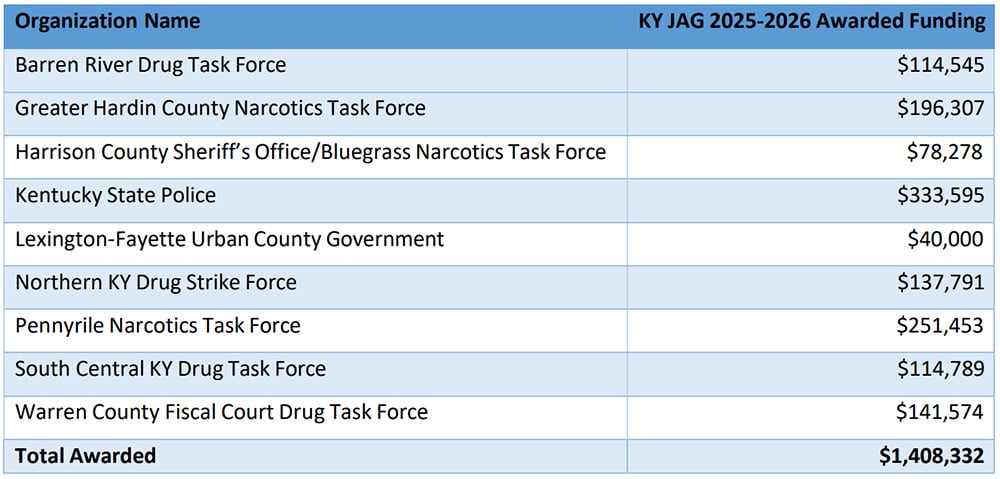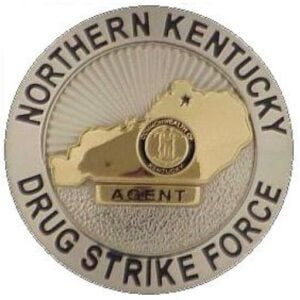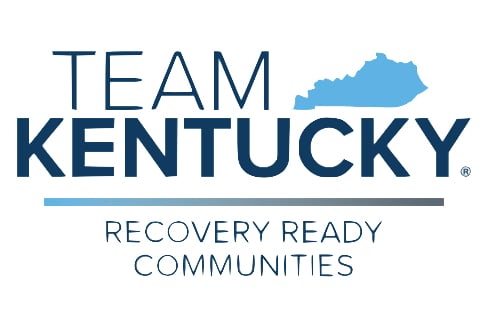Gov. Andy Beshear announced the awarding of more than $1.4 million in federal grant funding to nine state and local agencies to fight drug trafficking, including more than $137,000 for the Northern Kentucky Drug Strike Force.
The Edward J. Byrne Memorial Justice Assistance Grant (JAG) will allow Kentucky’s law enforcement agencies, drug task forces and nonprofit organizations to purchase critical resources, provide drug prevention programming to community residents, offer counseling to crime victims, ensure officers receive specialized training, and work with individuals leaving incarceration for successful reentry skills.
“Fighting addiction is a team effort that requires work from every single one of us,” Gov. Beshear said. “Only together can we provide support for our loved ones struggling with addiction and make sure no one has to walk the path to recovery alone.”

The Beshear administration remains committed to saving lives from addiction after recording three straight years of decline in overdose deaths, including a 30.2% decrease from 2023 to 2024.
The Northern Kentucky Drug Strike Force serves the Northern Kentucky communities within Campbell, Kenton, and Boone Counties. The agency is supported by task force officers from the Boone County Sheriff’s Office, Kenton County Police Department, Campbell County Police Department, Erlanger Police Department, Fort Thomas Police Department, Covington Police Department, Southgate Police Department, Cincinnati DEA and Kentucky State Police.
Leaders from several organizations explained how these funds will assist them in combating the sale, distribution and transportation of illegal drugs and increase the safety of their communities.
The Bowling Green–Warren County Drug Task Force, the Barren River Drug Task Force and the South-Central Kentucky Drug Task Force have each been awarded funding to support additional positions that will better support coordination and bolster prevention efforts across Southern Kentucky.
The Bowling Green–Warren County Drug Task Force has been awarded $141,574 to support prevention efforts in Kentucky’s third-largest city and the surrounding county.

“This funding is critical to drug enforcement in Kentucky for both state and local governments. This support allows us to keep our enforcement efforts strong and effective,” Bowling Green–Warren Drug Task Force Director Tommy Loving said. “So far this year, the Bowling Green–Warren County Drug Task Force has seized 50 pounds of cocaine, 34 pounds of Mexican-manufactured methamphetamine, 500 doses of deadly fentanyl, 280 pounds of marijuana, 3,049 THC/marijuana vapes, and 32 pounds of THC/marijuana products.”
The Barren River Drug Task Force has been awarded $114,545 to improve prevention efforts in Barren and Metcalfe counties.
“The Barren River Drug Task Force covers Barren and Metcalfe Counties. Without the Byrne Jag funding, we could not fight the drug battles that we are in today,” said Barren River Drug Task Force Director Ron Lafferty. “We are seizing record numbers of crystal meth, cocaine and fentanyl like we have never seen before, and it would not be possible without the Byrne JAG funding.”
$114,789 has been awarded to the South-Central Kentucky Drug Task Force to provide additional resources and support to those struggling with addiction in Allen and Simpson counties.
“The South-Central Kentucky Drug Task Force uses Bryne JAG funding to cover personnel and operations costs,” said South-Central Kentucky Drug Task Force Director Jacky Hunt. “We rely on this funding to keep the doors open to fight drug crime and overdose deaths in our area, including Simpson and Allen counties.”
For more information on the Edward Byrne Memorial Justice Assistance Grant, visit bja.ojp.gov.
Fight against addiction
In May of this year, Gov. Beshear announced that overdose deaths in the commonwealth decreased for the third year in a row, with a 30.2% decrease in 2024 compared to the previous year.
Earlier this month, six more counties were certified by Gov. Beshear as Recovery Ready Communities for their ability to provide addiction and recovery treatment, job services and transportation to these services, bringing the number of certified counties up to 31.
Gov. Beshear has continued to fight the state’s drug epidemic since his time as attorney general, when he led the nation in the number of individual opioid lawsuits filed by an attorney general. Now, Gov. Beshear is working to make sure the hundreds of millions of dollars in settlement funds go to treatment and the communities impacted.
Recently, Gov. Beshear banned the drug bromazolam, or “Designer Xanax,” from being sold in Kentucky and providing law enforcement the ability to make arrests for sales or possession.
The state’s Treatment Access Program also allows those without health insurance to enter residential treatment, and the Recovery Ready certification helps communities support residents who are seeking help for drug or alcohol addiction. The Beshear-Coleman administration created a website to help people in recovery find housing, FindRecoveryHousingNowKY.org, and a website to support Kentuckians seeking second chances find a job, get an education or continue recovery, SecondChance.ky.gov. The site also connects business leaders with resources to help them hire second-chance talent.
Treatment resources
If you or a loved one is struggling with addiction, the KY HELP Call Center can connect you to treatment by calling 833-8KY-HELP — 833-859-4357.
Information about treatment programs all across the commonwealth is available at FindHelpNowKy.org. Information on how to obtain the life-saving drug naloxone, which is used to reverse an opioid overdose, can be found at that website as well as at FindNaloxoneNowKy.org and FindMentalHealthNowKy.org.
Visit the Kentucky State Police website to find one of KSP’s 16 posts where those suffering from addiction can be paired with a local officer who will assist with locating an appropriate treatment program. The Angel Initiative is completely voluntary, and individuals will not be arrested or charged with any violations if they agree to participate in treatment.
Kentucky Justice and Public Safety Cabinet


















